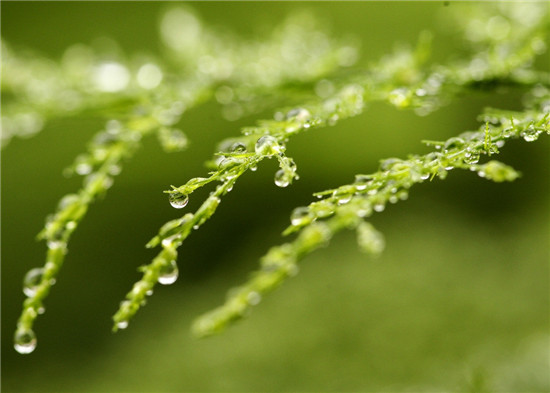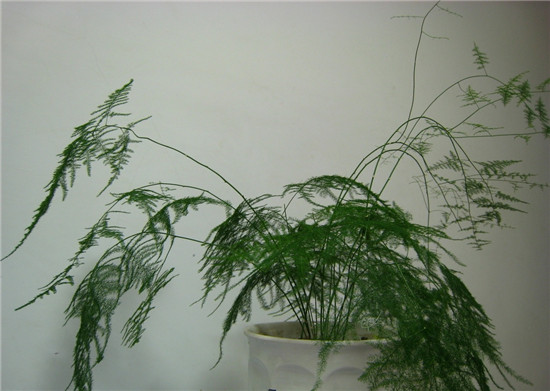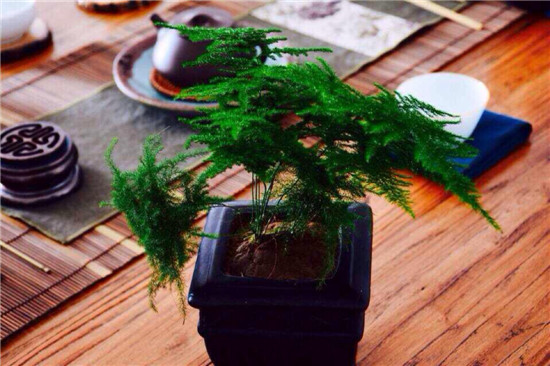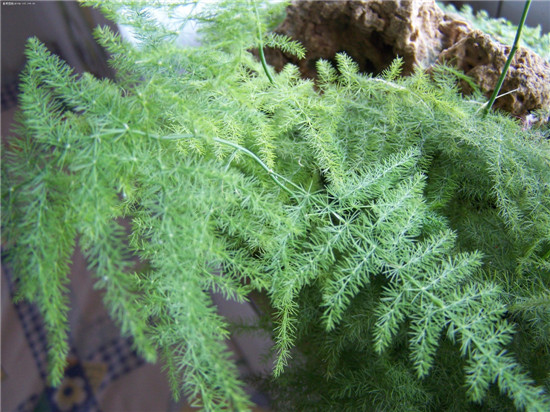What are the cultivation methods and precautions of Wenzhu?
There are many friends who like asparagus. Although asparagus is not bamboo, its branches are very similar to bamboo. Next, let's take a look at the breeding methods and precautions of asparagus.

The key to asparagus management is watering. Watering too often, branches and leaves are easy to yellowing, poor growth, easy to cause rotten roots. The amount of water should be adjusted according to plant growth and season. In winter, spring and autumn, watering should be properly controlled. Generally, the surface of the basin soil is dry and then irrigated. If you feel that it is difficult to grasp the amount of water, you can also take the alternation of large and small water. That is, after 3-5 times of small water, pour water once, so that the basin soil remains moist and does not contain much water. It should be watered in the morning and evening in summer, and it doesn't matter if the amount of water is a little larger.
The pot soil should be watered only when it is dry. In the growth period to fully irrigate, but not too much watering, otherwise easy to rot roots, should grasp the degree that water quickly seeps into the soil and the soil surface does not accumulate water. Watering should be reduced after the end of autumn. During the growth period, organic fertilizer can be applied every 20 days, such as rotten cake fertilizer and water. It should be kept in a warmer place indoors in winter.

Although asparagus does not like fertilizer very much, it should be supplemented with more nutrients when potted, especially the plants that are going to keep seeds. The fertilization of asparagus should be thin and diligent, and thick fertilizer should not be used. The rotten organic liquid fertilizer is generally applied every 15-20 days in the growing season. Asparagus likes slightly acidic soil. Therefore, it can be combined with fertilization, appropriate application of some alum fertilizer and water to improve soil acidity and alkalinity.
Asparagus should spend the winter indoors, and the room temperature should be kept at about 10C in winter, and enough light should be given, so that it can be moved to outdoor maintenance after April next year.
Asparagus planted in the ground, with luxuriant branches and leaves, and rapid growth of new vines, must be set up in time to facilitate ventilation and light. Proper pruning of dead branches and old vines to promote the germination of new vines. Apply bone powder or superphosphate once before flowering to improve the seed setting rate.
As a cutting asparagus, the branches that meet the requirements of listing are cut at the root during harvest, and every 20 branches are bandaged and listed on the market, and the price in winter is generally more than 20% higher than that in summer and autumn.

Propagation methods and matters needing attention of asparagus:
1. Sowing seeds
Sowing is the main method of propagation of asparagus. When the pericarp of asparagus seed blackens and softens, it is ripe, then it should be picked gradually according to the degree of maturity, rubbed to remove the pulp, cleaned with clean water, dried and stored semi-dry. Sowing in early April can be used as a commercial seedling or furnished indoors in the autumn of that year. The sowing substrate is generally fine sand and the container is tile basin or wooden box. Put the seeds on the basin soil at a distance of 2-3 meters, 2-3 seeds in each hole. After sowing, it is covered with fine sand 5mm thick, covered with glass or plastic film, the temperature is maintained at 20-25 ℃, and water is often sprayed to keep the basin soil moist. About 30 days after sowing, the seedlings began to sprout. When the height of the seedling is 4-5 cm, it can be transplanted and cultured, and when it is 8-10 cm, it can be planted in the pot.

two。 Ramet
Family potted plants can also be propagated by ramets. Asparagus has a strong clump, and the 4-5-year-old plants can sprout root tillers from the rhizosphere continuously, so that the clumps of plants continue to expand. In spring, new plants can be obtained by changing pots and dividing them into tufts and planting them on pots respectively.
The above is all the contents of the breeding methods and matters needing attention of asparagus that I have summarized for you. I hope this article can help you. Please continue to follow us.
Related
- Wuhan Hospital Iron Tree Blooming Result Was Instantly Frightened by the Gardener Master
- Which variety of camellia is the most fragrant and best? Which one do you like best?
- What is the small blue coat, the breeding methods and matters needing attention of the succulent plant
- Dormancy time and maintenance management of succulent plants during dormancy
- Minas succulent how to raise, Minas succulent plant pictures
- What are the varieties of winter succulent plants
- How to raise succulent plants in twelve rolls? let's take a look at some experience of breeding twelve rolls.
- Attention should be paid to water control for succulent plants during dormant period (winter and summer)
- Watering experience of twelve rolls of succulent plants
- Techniques for fertilizing succulent plants. An article will let you know how to fertilize succulent plants.



